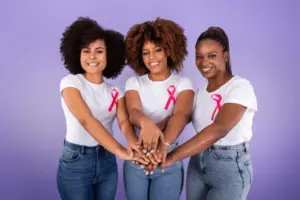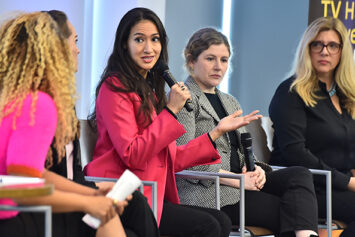Last updated:
Before, during and even after a cancer diagnosis, young Black women face unique challenges that are either not present or are less severe for their white counterparts.
On March 15, 2021, Hollywood, Health & Society brought together health experts and writers/producers for a webinar that explored how racism, bias and a mistrust of the medical system all affect the outcome for young Black women with breast cancer, and the ways TV storylines can raise awareness about health disparities.
CDC reports that 1 in 10 women diagnosed with breast cancer are under the age of 45, and Black women under age 35 have higher breast cancer rates than their white counterparts. Breast cancer in young women is more likely to be hereditary, found at a later stage, and an aggressive type of cancer making it more difficult to treat. Black women face both an increased risk of breast cancer at a young age and systemic barriers and challenges in cancer detection and prevention.
Breast Cancer Disparities in Young Black Women

There are many barriers and inequities for young Black women in getting an early breast cancer diagnosis and the medical care they need:
-
More aggressive forms of breast cancer: Black women are more likely to be diagnosed with more aggressive forms of breast cancer, like triple negative breast cancer.
-
Delayed treatment: Black women are more likely to receive treatment later and have longer lasting treatment than that of their white counterparts.
-
Higher mortality rates: Black women are more likely to die of breast cancer than white women.
-
Lack of dialogue: For some Black families, there is a stigma around discussing family health history which can contribute to an overall lack of risk awareness.
-
Structural and interpersonal racism: Structural racism can make health care difficult to pay for, access, and navigate. Interpersonal racism can be seen in a health care provider’s conscious or unconscious racial prejudice resulting in discriminatory behavior or actions that block Black women’s access to resources or adequate health care.
The Effects of Racism on Breast Cancer Health Disparities

Black women may face many harmful stereotypes that contribute to late-stage diagnosis and higher mortality rates. Historical mistreatment by the medical community has made it difficult for many Black women to trust their health care providers. Providers play a vital role in recognizing their own biases and how much of an effect they have on a young Black woman’s chance of survival against early onset breast cancer. Racism and bias, whether explicit or implicit, from the medical community can make this difficult for Black women. Self-advocacy, being persistent about sharing symptoms, and learning about risk can be lifesaving – so it’s important for Black women to see a healthcare provider they feel comfortable with.
Managing Your Risk

For young women, understanding their risk for breast cancer starts with learning about their family history and sharing that with a doctor. Young women who have a family history of breast, ovarian, high grade or metastatic prostate, pancreatic, and other cancers among women and men on either side of their families may have a BRCA1 or BRCA2 genetic mutation that raises their risk for breast and other cancers. All young women should collect as much information as possible about their family health history, and those with a family history of cancer should ask their doctor if genetic counseling and testing is right for them. There are several steps young women with a high risk can take to lower and manage their risk and be in the driver’s seat of their own health, including surgery, medication, and various types of screenings.
All women with an average risk of breast cancer should get a mammogram starting at age 40 and ask their doctor if they need to start screening earlier based on their individual risk.
Additionally, all women can be proactive about lowering their risk by maintaining a healthy weight, drinking less alcohol, getting regular physical activity, and breastfeeding their babies if possible.
Many young women diagnosed with breast cancer do not have a known family history of cancer, so it’s important for all young women to know how their breasts normally look and feel and that not all breast cancers present as a lump. Women should talk to a healthcare provider immediately if they notice any concerning changes to their breasts.
Life After Diagnosis

Young women diagnosed with breast cancer face unique challenges:
-
Mental health issues, including feelings of isolation and loneliness
-
Effects that some treatments may have on fertility and how this can influence plans to build
their families in the future
-
Body image and sexual health concerns, including concerns about sexual intimacy, dating, and early onset menopause symptoms as a result of treatment
-
Potential for adverse effects on romantic and familial relationships and friendships
-
Financial burdens of treatment, due to the often heavy costs and potential disruptions to employment and career
-
For some, an added burden of caring for young children during treatment and managing the emotional toll that their diagnosis may have on their young children and families
Young women diagnosed with breast cancer should work closely with their health care team to understand the effects of their treatments on their physical and emotional health.
Young Black Women Facing Racism, Bias—and Breast Cancer
A HH&S webinar that explores how racism, bias and a mistrust of the medical system all affect the outcome for young Black women with breast cancer.

The Power of TV: Reshaping Breast Cancer Narratives
TV Academy discussion about young women affected by early onset breast cancer, how the disease disproportionately affects women of color, and the importance of messaging to raise awareness about risk.

More to My Story: Navigating Breast Cancer, Fertility and Family Planning
HH&S hosted an online panel discussion about an issue that weighs heavily on young women affected by breast cancer, yet is rarely discussed.


